CRISP THIN-CRUST PIZZA WITH TAPENADE
From choclytcandy 15 years agoIngredients
- Crisp Thin-Crust shopping list
- 2 cups unbleached all-purpose flour (10 ounces) Gold Medal or Pillsbury - protein content no higher than 10.5 percent shopping list
- 1/2 teaspoon rapid-rise yeast or instant shopping list
- 1/2 teaspoon honey shopping list
- 1/2 teaspoon table salt shopping list
- 3/4 cup water plus 2 teaspoons, preferably filtered or spring, 100 to 105 degrees shopping list
- 1/4 cup olive oil shopping list
- 8 ounces whole milk mozzarella , shredded (about 2 cups) shopping list
- Quick tomato sauce shopping list
- 1 can (14 1/2 ounces) crushed tomatoes shopping list
- 1 large clove garlic minced or pressed through garlic press shopping list
- 1 tablespoon olive oil shopping list
- tapenade shopping list
- 3 tablespoons extra virgin olive oil shopping list
- 1 1/2 cups pitted kalamata olives shopping list
- 2 tablespoons shredded fresh basil leaves shopping list
- 2 teaspoons fresh rosemary leaves shopping list
- 1 tablespoons capers , rinsed shopping list
- 4 anchovy fillets , rinsed shopping list
How to make it
- Note:
- All-purpose unbleached flour with a protein percentage no higher than 10.5, such as Gold Medal, makes the lightest, crispiest pizzas. We recommend weighing the flour and water, but because many factors affect the flour’s capacity to absorb water, heed visual and tactile clues to achieve a dough with the proper consistency. For rolling out the dough, we prefer commercial-sized parchment paper sheets, though parchment sold in rolls 14 inches wide also works. Keep in mind that it is more important for the rolled dough to be of even thinness than to be a perfect circle. For topping the pizzas, we recommend buying whole milk mozzarella and shredding it by hand with a box grater; do not use fresh or prepackaged shredded mozzarella, and resist the temptation to sprinkle on more cheese than is recommended. Between baking pizzas, allow the baking stone to reheat for 15 minutes.
- DAY ONE:
- 1. Combine flour, yeast, honey, and salt in workbowl of food processor fitted with steel blade. With machine running, add all but 2 teaspoons water through feed tube. With machine still running, add olive oil through feed tube and process until dough forms ball, about 30 seconds. Turn dough out onto work surface. See "How to Achieve the Proper Consistency" below, to see if dough needs more water and to finish kneading.
- 2. Divide dough in half and place each piece in gallon-sized, heavy-duty zipper-lock plastic bag and seal. Refrigerate overnight or up to 48 hours.
- DAY TWO:
- 1. Adjust oven rack to lowest position, set baking stone on rack, and heat oven to 500 degrees. Heat baking stone 1 hour before proceeding.
- 2. Remove dough from plastic bags. Set each half in center of lightly floured large sheet parchment paper. Cover each with two 18-inch lengths plastic wrap overlapping in center (alternatively, use one 18-inch length of extrawide plastic wrap); let doughs rest 10 minutes.
- 3. Setting one dough aside, follow illustrations 1 through 3 below to roll one dough into 14-inch round with even thinness of 1/32 inch, using tackiness of dough against parchment to help roll. If parchment wrinkles, flip dough sandwich over and smooth wrinkles with metal dough scraper.
- 4. Following illustrations 4 and 5, peel plastic wrap off top of rolled dough. Use soup spoon to spread and smooth ½ cup tomato sauce (procedure for quick tomato sauce follows) to edges of dough. Sprinkle with about 1 cup cheese. With scissors, trim excess parchment so that it is just larger than dough.
- 5. Slip dough with parchment onto pizza peel, inverted rimmed baking sheet, or rimless baking sheet. Following illustration 6, slide pizza, parchment and all, onto hot baking stone. Bake until deep golden brown, about 10 minutes. Remove from oven with pizza peel or pull parchment with pizza onto baking sheet. Transfer pizza to cutting board, slide parchment out from under pizza. Immediately spoon 8 teaspoons Tapenade (recipe follows) over pizza; cut pizza into wedges and slide onto wire rack. Let cool 2 minutes until crisp; serve.
- 6. While first pizza is baking, repeat steps 3 and 4 to roll and sauce second pizza; allow baking stone to reheat 15 minutes after baking first pizza, then repeat step 5 to bake second pizza.
- FOR QUICK TOMATO SAUCE: Process tomatoes in workbowl of food processor fitted with steel blade until smooth, about five 1-second pulses. Heat garlic and oil in medium saucepan over medium heat until garlic is sizzling, about 40 seconds. Stir in tomatoes; bring to simmer and cook, uncovered, until sauce thickens enough to coat wooden spoon, about 15 minutes. Season to taste with salt and pepper.
- FOR TAPENADE: Place ingredients in workbowl of food processor. Process, stopping as necessary to scrape down sides of bowl, until mixture is finely minced and forms a chunky paste, about 1 minute. Transfer mixture to small bowl. (Surface of tapenade can be covered with plastic wrap or film of olive oil and refrigerated for up to 3 days.)
- How to Achieve the Proper Dough Consistency:
- 1. A freshly processed dough with adequate water will look shaggy and stick to the counter. A few "throws" against the counter will help the dough become supple and fine-textured. 2. On the other hand, a freshly processed dough that is too dry will form a clean ball, feel more oily than moist, and look slightly curdy on the surface. 3.To moisten a processed dough that is too dry, add 1 teaspoon water and throw the dough against the counter 10 times. The dough may take up to 2 teaspoons additional water. 4. A properly kneaded dough with enough water will be supple and fine-textured. Though moist and sticky, the dough should have structure and not feel "batter-like."
- Six Steps to Perfect Pizza:
- 1. Once the dough is about 8 inches in diameter, use the rolling pin as illustrated to stretch and feather the dough. 2. If the parchment wrinkles, flip the dough sandwich over and smooth the wrinkles with a metal dough scraper. 3. Glide a palm over the rolled-out dough to get a sense of its evenness. 4. Peel the plastic wrap off the top of the rolled dough. 5. Use a soup spoon to smooth 1⁄2 cup sauce to the edges of the dough. 6. Slide the pizza, parchment and all, onto the pizza stone.
People Who Like This Dish 2
- boosan21 Pleasant Valley, CT
- lizzconn Naas Co Kildare, IE
- choclytcandy Dallas, Dallas
- Show up here?Review or Bookmark it! ✔
The Groups
- Not added to any groups yet!
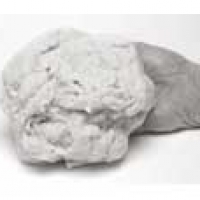
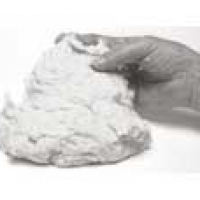
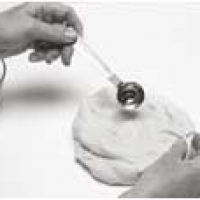
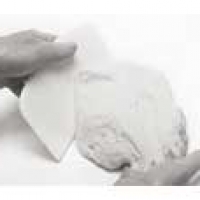

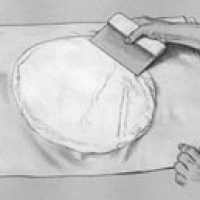


Reviews & Comments 0
-
All Comments
-
Your Comments